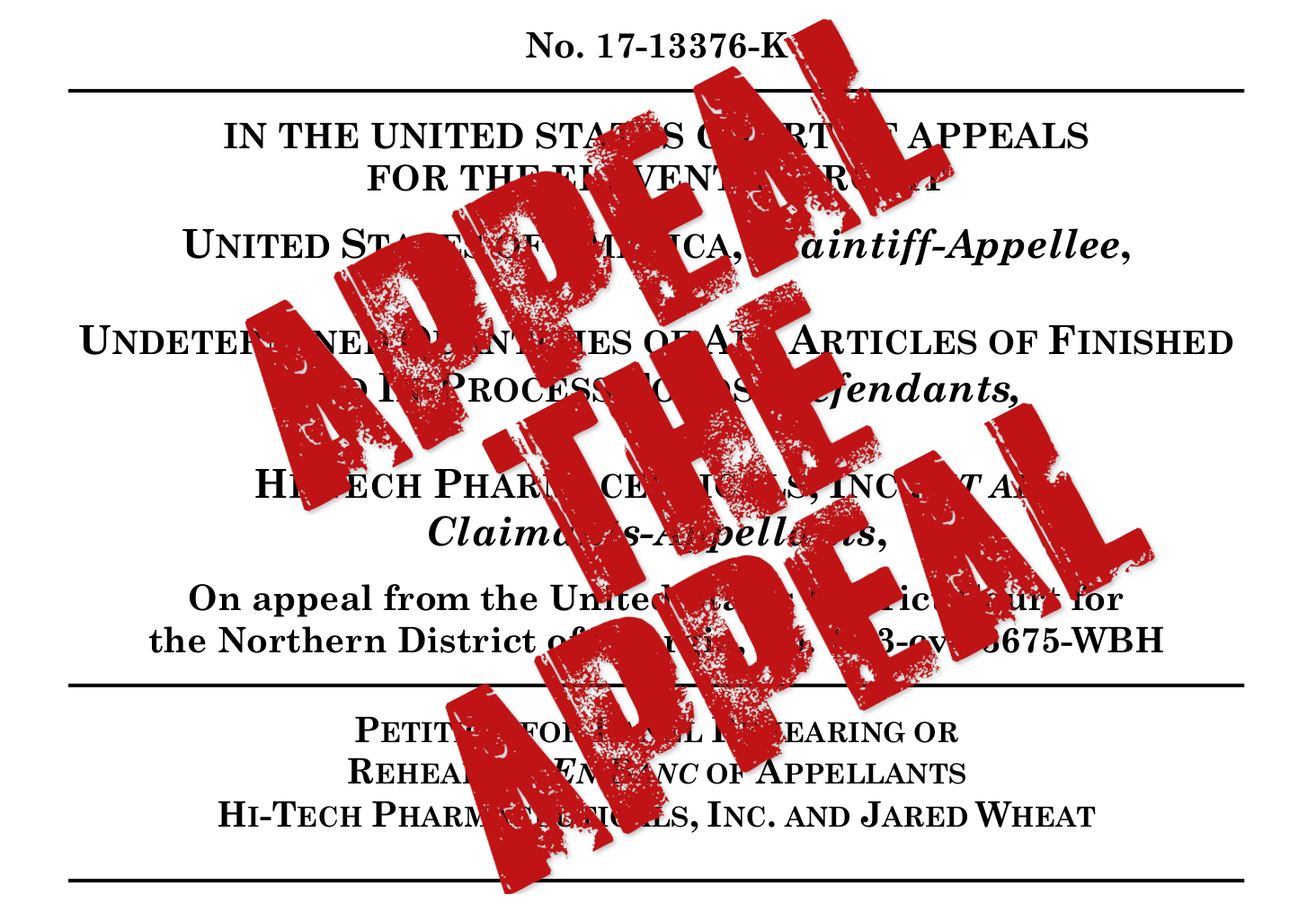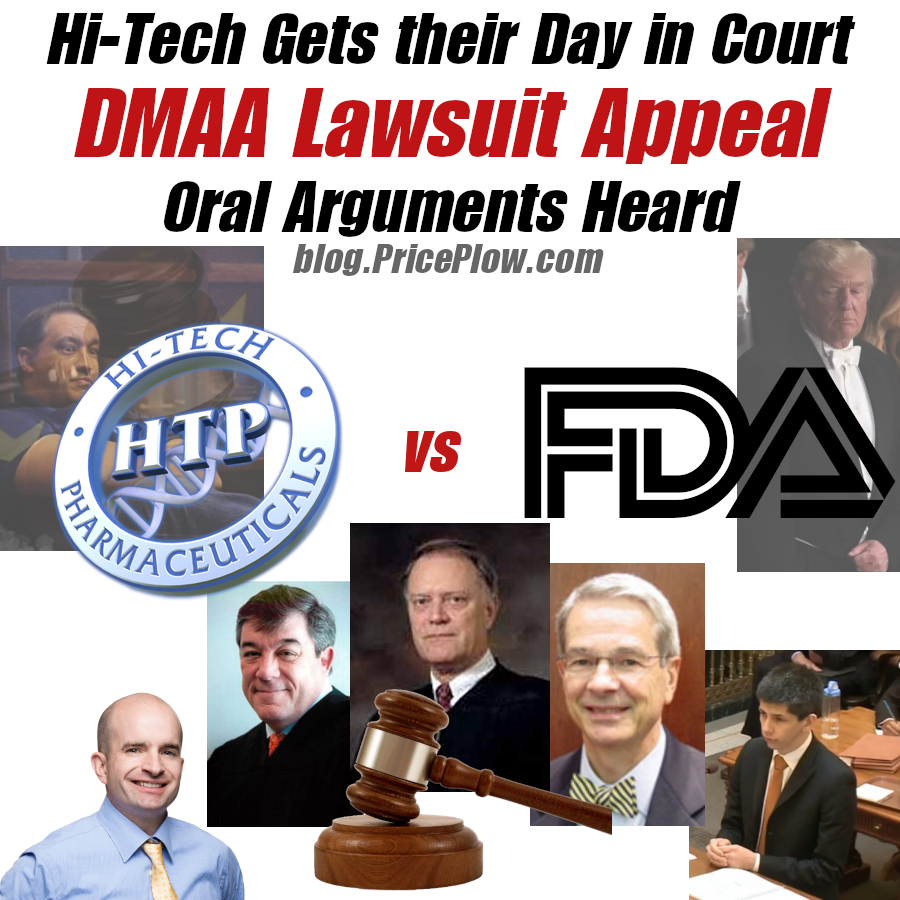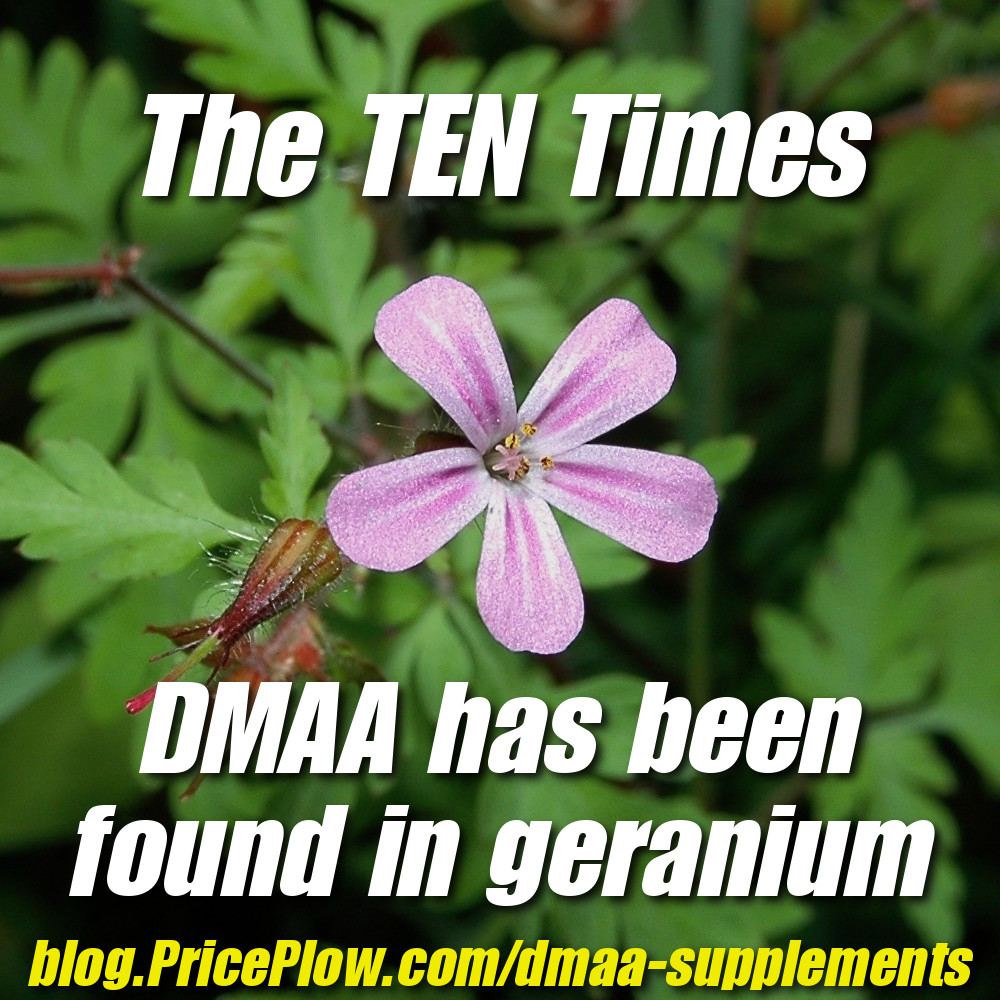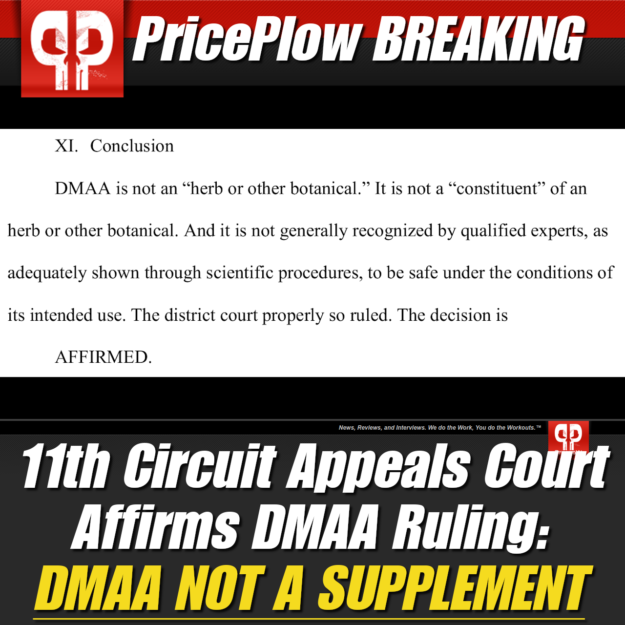Update April 17, 2020: Hi-Tech Pharma's request for an En Banc Review (filed October 15, 2019) has been denied. See the Judge's final response here.
This effectively ends the Hi-Tech DMAA Lawsuit, unless they were to somehow take this to the Supreme Court, which seems unlikely given the current political climate.
On August 30, 2019, three judges in a panel from the 11th Circuit's Court of Appeals upheld the District Court's decision that despite having been found in nature several times, DMAA is not a Dietary Supplement per the Dietary Supplement Health and Education Act of 1994 (DSHEA).

Hi-Tech Pharmaceuticals has filed an en banc appeal, claiming that the two majority judges not only got it wrong, but will affect other parts of the industry.
In that decision, two of the judges (Hon. Gerald Bard Tjoflat and Hon. Robert Lewis Hinkle, who are the majority) sided with the FDA and affirmed the District Court's previous decision against DMAA, while one judge (The Honorable Adalberto Jordan, the dissenting) sided with the arguments presented by Hi-Tech Pharmaceuticals. In his dissent, Judge Jordan stated that a new district court case should be held to determine once and for all if DMAA could be found in geraniums.
Noteworthy is that Judge Hinkle is not a permanent member of the 11th Circuit Court of Appeals, but there on temporary assignment.
Because of the dissent (discussed in more detail below), and the way this decision could affect several other situations of importance, Hi-Tech Pharmaceuticals has filed for an en banc review and is requesting a rehearing or a reversal of judgment. In an en banc review, the case would be heard before all appellate judges, but this would only happen if a majority of the active judges decide to hear it after reviewing the request. That request is below:
How do you define the words "constituent" and "botanical"? DMAA's life depends on them.
The appeal ultimately came down to the definition of the words "constituent" and "botanical', two words that weren't clearly defined by Congress when they wrote the law in 1994.

Hi-Tech got their day in court, and behind lawyer John Neiman and some fiery judges, Jared Wheat's team made the best of it.
In siding with the FDA, Tjoflat and Hinkle argued that DSHEA's terms for ingredients—"concentrate[s]," "extract[s]," "combination[s]," and "metabolite[s]" -- should be interpreted as "usable form or amount" and cannot include a "substance that is present in a plant in only trace amounts".
They reached this decision by using certain dictionary definitions that would exclude it from being considered a constituent of a botanical, but rejecting other dictionary definitions that would have included DMAA as a constituent of a botanical.
Judge Jordan's dissent from those statements was more simple: "the statutory text does not provide a basis for... the majority's holding." In addition, there are plenty of definitions
Dictionaries cited included Merriam-Webster, Oxford, American Heritage, and Webster's. As childish as that may seem, this seems to be the best that the judges can do, given the sharp corner case we've found ourselves in and the vagueness of 1994 DSHEA. We can't go back and ask those Congressmen what they meant, after all, so it's up to the courts to interpret those laws. Yet they cannot rewrite those laws. Hi-Tech's legal team argues that this is ultimately what is happening through the majority's "interpretation".
John C. Neiman, Hi-Tech's attorney who wrote this (and also argued this position in front of the panel of judges), puts his concerns quite clearly with the majority:
The critical question instead is whether DMAA is a constituent of a geranium—and it is hard to describe the majority's opinion as doing anything besides writing words into the statute on this front.
-- Hi-Tech Pharmaceuticals Legal Team (John C. Nieman)
Why grant an en banc review?

Hi-Tech should be able to prove how much DMAA they can truly pull out of geranium, because there is strong evidence for DMAA being in geranium robertianum. The FDA obviously doesn't want to go down this road again though.
On top of Hi-Tech's arguments that the majority is simply wrong in its definition, they point out that DMAA is not the only compound which is found in trace amounts, and this could have greater industry and health ramifications if the court allows for such a tight interpretation of DSHEA 1994. They argue that resveratrol and pterostilbene are two other ingredients which could suffer a similar fate, and many rely on these supplements for cellular health and longevity.
This makes it a "matter of exceptional importance" that warrants the en banc review. If the review is granted, a date will likely be set for further hearings.
Long story short, Hi-Tech is appealing the decision of the appeal. Truly the last stand before the Supreme Court, who possibly wouldn't take the case.
Stay tuned to PricePlow and our Hi-Tech Pharmaceutical news alerts for more updates as they come:
Subscribe to PricePlow's Newsletter and Alerts on These Topics
Hi-Tech Pharmaceuticals – Deals and Price Drop Alerts
Get Price Alerts
No spam, no scams.
Disclosure: PricePlow relies on pricing from stores with which we have a business relationship. We work hard to keep pricing current, but you may find a better offer.
Posts are sponsored in part by the retailers and/or brands listed on this page.
Until then, just remember our key document, which details the ten (actually eleven) times DMAA was found in geranium.
Older news from the appeal ruling
BREAKING (August 30, 2019): The United States 11th Circuit Court of Appeals has upheld the district court ruling, stating the following:
DMAA is not an "herb or other botanical." It is not a "constituent" of an herb or other botanical. And it is not generally recognized by qualified experts, as adequately shown through scientific procedures, to be safe under the conditions of its intended use. The district court properly so ruled. The decision is AFFIRMED.
This page will be updated and news will be released shortly.
The official "conclusion" is on page 22 in the PDF linked above.
Jared Wheat Responds with Comment
No we are going to see an en banc rehearing as we believe Judge Jordan dissent was the correct interpretation. Judge Hinkle will not be part of an en banc ruling as he was sitting by designation due to the 11th circuit being short judges. There are 12 active judges and we will start 1 versus 1. Tjolflat is also retiring and may not be in the en banc decision as he is going to be 90 in December.
Eleventh Circuit rule:
11th Cir. R. 35-3 Extraordinary Nature of Petitions for En Banc Consideration. A petition for en banc consideration, whether upon initial hearing or rehearing, is an extraordinary procedure intended to bring to the attention of the entire court a precedent-setting error of exceptional importance in an appeal or other proceeding, and, with specific reference to a petition for en banc consideration upon rehearing, is intended to bring to the attention of the entire court a panel opinion that is allegedly in direct conflict with precedent of the Supreme Court or of this circuit. Alleged errors in a panel's determination of state law, or in the facts of the case (including sufficiency of the evidence), or error asserted in the panel's misapplication of correct precedent to the facts of the case, are matters for rehearing before the panel but not for en banc consideration
11th Cir. R. 35-2 Time - Extensions. A petition for en banc rehearing must be filed within 21 days of entry of judgment, except that a petition for en banc rehearing in a civil appeal in which the United States or an agency or officer thereof is a party must be filed within 45 days of entry of judgment. Judgment is entered on the opinion filing date. No additional time is allowed for mailing. Counsel should not request extensions of time except for the most compelling reasons. For purposes of this rule, a "civil appeal" is one that falls within the scope of 11th Cir. R. 42-2(a)
-- Jared Wheat, CEO, Hi-Tech Pharmaceuticals



Comments and Discussion (Powered by the PricePlow Forum)